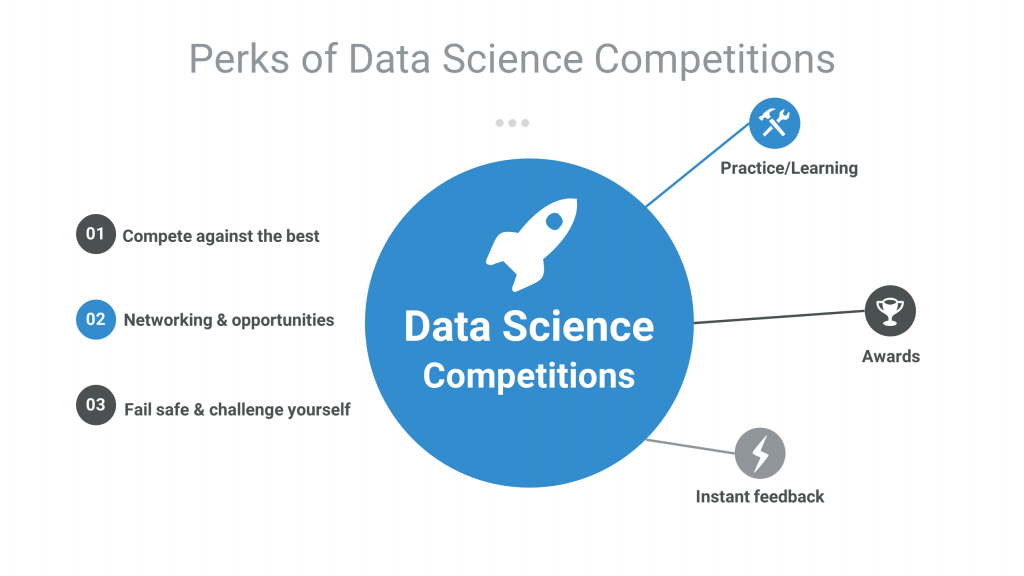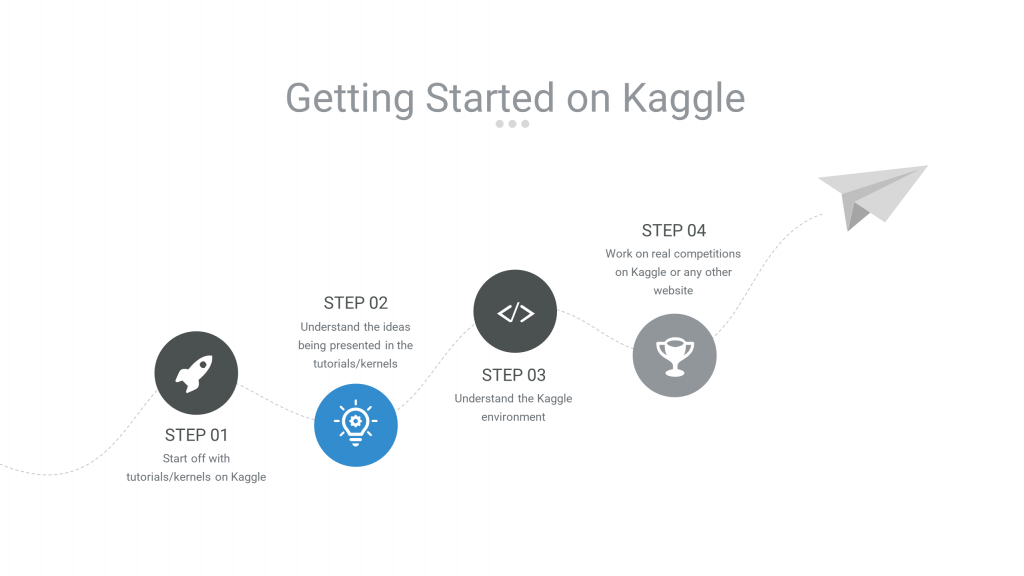Often people refer to several online resources when learning to build machine learning and statistical models. However, gathering knowledge by reading will only get you so far. And to become a great Data Scientist, you’ll need a ton of practice. A great way to improve your skills is by solving several real-life Data Science challenges. Solving different types of challenges can help you become a better problem solver, learn the intricacies of various modeling techniques, prepare for job interviews, understand how your model works in practice and more. So for beginners, I recommend solving lots of Data science challenges and working on real-competitions.
In this article, I will only focus on why you should participate in data science competitions and how you can get started with one.
Well, what makes challenges the best mode of learning?

The main reason to compete is that you learn a great deal by participating in a competition. Gamification is fun and time-bound that pushes your limits to dig deep down into a subject, showcase your talent and become better at it. It is also a great setting to learn where failure does not bear any severe consequences and you can measure your skills in the subject against others. In nut-shell, it helps in the following ways:
- Instant feedback/learning: You get instant feedback about the statistical/machine learning models you have applied
- Gain substantial experience by solving real-world problems
- Pit against others and probably the best: In gamification, pitting against others would encourage learners and experts to come up with innovative solutions/approaches
- Learn from the community/fellow participants: You can look and analyze the solutions submitted by the other participants and learn from it
- Fail-safe: There is nothing for you to lose by participating in a challenge. There is a lot to learn and gain out of the entire experience
- Challenge yourself
In addition to learning, participating in the challenges will also help you to taste the following perks:
- Networking: You get to network with a diverse pool of Data Scientists which could help in various ways (learning best practices, meeting new people, learning from their experiences, new career opportunities etc.,)
- Career opportunities: You will stand out from the crowd if you do well in some of the Data Science challenges and it might very well increase your chances to get hired in your dream company.
- Reputation and rewards: If you participate in challenges and gradually become better, it not only helps you shine in the community but also earns tons of rewards.
How to get started with Data Science Competitions?
There are quite a few popular Data Science competition websites such as Kaggle, Tianchi, Analytics Vidhya, etc. In this article, I will focus on how to get started on Kaggle.

Well, before I begin. Here is a word of caution for all the Data Science aspirants/buds.
Never jump the gun: While diving into the world of Data Science challenges is always great, it is not recommended for budding/aspiring Data Scientists to jump in directly without equipping themselves for the journey ahead. Not equipping properly could as well be intimidating and eventually lead to leaving the world of Data Science competitions or Data Science in general. Hence, I strongly recommend you to equip yourself with basic programming skills, understand the syntax of a programming language (start with R or Python, these are the most preferred languages used by Data Scientists) and some basic concepts of Data Exploration, Cleaning, and Modeling techniques before you dive deep into the world of Data Science Challenges.
- Start off with the tutorials: For tutorials on Kaggle, you will have to follow this link: https://www.kaggle.com/tags/tutorial. I strongly recommend you to follow the kernels (kernels are a combination of environment, input, code, and output – all stored together and in a few cases a detailed explanation of how a problem is solved is given by the Data Scientists) written by some of the best and top-rated Data Scientists on Kaggle. The easiest way to find good kernels is by sorting based on “most votes” and one can go further to look at the profile of the kernel author to understand their credibility.
- Understand the ideas being presented: While reading kernels (notebooks/scripts) on Kaggle, it is extremely important to understand the thought process, the model used, its impact and the ideas that are being presented.
- Understanding the Kaggle environment: Pick any dataset (Kaggle datasets) on Kaggle and solve a problem. This will allow you to solve the problem at the same time you can understand how the Kaggle environment works.
- Work on real competitions: Once you understand the environment, you can get started with real-time competitions on Kaggle – listed here. Some of the top technology companies, research organizations and universities post interesting Data Science challenges on Kaggle. Go ‘all-in’ and start competing. You’ll certainly do well as you practice more and more. Just in case if you fail to solve challenges, there is no need to worry. You can go back to the competition page once it ends and analyze the approach/solutions submitted by the top-ranked Data Scientists, you will learn a great deal by reading/analyzing their solutions and understanding their approach towards the problem.
While there could be several apprehensions for you to get started, I would recommend you to leave everything behind and get started today.
Happy learning!